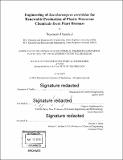Engineering of Saccharomyces cerevisiae for renewable production of plastic precursor chemicals from plant biomass
Author(s)
Uranukul, Boonsom.
Download1121594768-MIT.pdf (25.63Mb)
Other Contributors
Massachusetts Institute of Technology. Department of Chemical Engineering.
Advisor
Gregory Stephanopoulos.
Terms of use
Metadata
Show full item recordAbstract
Currently, plastics are almost exclusively produced from feedstocks derived from crude oil refining and natural gas processing. Despite the increasing awareness of the negative environmental and climate-related impacts associated with fossil fuel consumption, the relevance of fossil fuels has held steady as a result of the recent proliferation of plastics industry. The recent growing attempts to replace conventional petroleum-based production processes with renewable direct bioconversion processes, however, have not yet been made successful due to low production efficiency. Here, we studied the development of a bioprocess for the renewable production of monoethylene glycol (MEG), a precursor chemical of polyethylene terephthalate (PET) plastics, by using yeast Saccharomyces cerevisiae as biosynthesis platform. During the process, we found evidence for the existence of an endogenous biosynthetic route for MEG production from D-xylose in S. cerevisiae. Based on the discovered biosynthetic pathway, we then demonstrated the implementation of metabolic engineering and fermentation operational strategies that led to an overproduction of MEG, as well as improved strain performance during prolonged bioreactor cultivation. Using the MEG bioconversion process as the starting point, we developed another bioprocess which allowed direct conversion of D-xylose to glycolic acid, a chemical precursor of polylactic-co-glycolic acid (PLGA). Furthermore, we investigated the biosynthesis of 1,4- butanediol, a chemical precursor of thermoplastic engineering polymer polybutylene terephthalate (PBT), in S. cerevisiae. In all of these studies, ethanol fermentation emerged as an important limitation that negatively affected the efficiency of the yeast-based processes. Our attempts to disrupt ethanol fermentation, while successfully reducing ethanol production, led to a compromise in MEG production. An analysis on the energetics of our engineered S. cerevisiae, revealed that ethanol fermentation might, in fact, be a necessary requirement for maintaining the energy balance in certain systems, including the biosynthesis of MEG. These findings provide some insights as well as a better understanding of Saccharonyces cerevisiae as the microbial cell factory for the biosynthesis of small molecules other than ethanol.
Description
Thesis: Ph. D., Massachusetts Institute of Technology, Department of Chemical Engineering, 2019 Cataloged from PDF version of thesis. Includes bibliographical references.
Date issued
2019Department
Massachusetts Institute of Technology. Department of Chemical EngineeringPublisher
Massachusetts Institute of Technology
Keywords
Chemical Engineering.